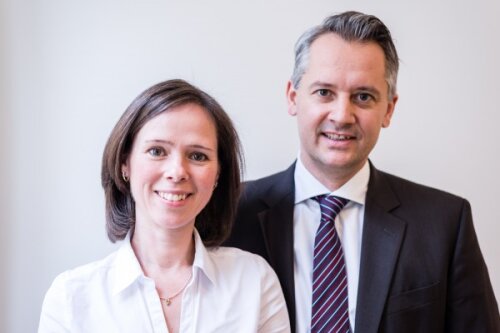Best Collaborative Law Lawyers in Miesbach
Share your needs with us, get contacted by law firms.
Free. Takes 2 min.
Free Guide to Hiring a Family Lawyer
List of the best lawyers in Miesbach, Germany
About Collaborative Law in Miesbach, Germany
Collaborative law is an out-of-court dispute resolution method used mainly in family law matters such as divorce, separation, child custody, visitation, maintenance and the division of assets. In the collaborative process each party is represented by a specially trained lawyer. The parties and their lawyers sign a participation agreement committing to negotiate in good faith and to avoid court proceedings. If negotiations break down, collaborative lawyers typically withdraw and do not represent the parties in subsequent litigation. In Miesbach the collaborative process is an option alongside mediation and traditional court litigation. Local practitioners who use the collaborative model tailor the process to Bavarian practice and to the requirements of German substantive and procedural law.
Why You May Need a Lawyer
Collaborative law is a structured negotiation process that still involves legal complexity. You may need a lawyer in collaborative matters for several reasons:
- To explain your legal rights and obligations under German law - for example with respect to divorce law, maintenance, child custody and property rules under the Buergerliches Gesetzbuch - BGB.
- To draft and review the written participation agreement and confidentiality provisions so they protect your interests.
- To calculate financial effects such as spousal maintenance, child support, pension splitting and tax consequences.
- To coordinate with other professionals - for example financial experts, child specialists or notaries - who often join collaborative meetings as neutrals.
- To ensure any settlement complies with formal requirements - for example notarial form or land register changes for property transfers, or court filings if a divorce settlement must be converted into a court order.
- To negotiate strategically while avoiding the costs, delay and adversarial atmosphere of court litigation, particularly when children are involved and preserving future co-parenting relationships is important.
Local Laws Overview
Key legal and local points relevant to collaborative law in Miesbach include:
- Applicable legislation - Family law in Germany is primarily governed by the Buergerliches Gesetzbuch - BGB. Procedural rules for family matters are contained in the FamFG - the Act on Proceedings in Family Matters and in Matters of Voluntary Jurisdiction. Collaborative agreements must be consistent with these statutes.
- Family court - If a court becomes necessary, family law matters in Miesbach are handled by the Familiengericht at the Amtsgericht Miesbach. Collaborative processes seek to avoid court where possible, but any finalized agreements that require judicial recognition will follow the local court procedures.
- Child welfare standard - Decisions about custody, parental care and contact must comply with the german legal standard of Kindeswohl - the best interests of the child - and, where relevant, authorities such as the Jugendamt will continue to have a role.
- Property and land registry - Real estate transfers and many changes affecting ownership require notarization and registration in the Grundbuch. Collaborative settlements that transfer property must be implemented through a Notar to be legally effective.
- Professional secrecy and conduct - Attorneys in Germany are bound by professional secrecy and by the rules of the Rechtsanwaltsordnung. Collaborative participants normally sign confidentiality and participation agreements to regulate communications during the process.
- Cost and fee framework - Attorney fees are generally governed by the Rechtsanwaltsvergütungsgesetz - RVG - though parties and lawyers can agree alternative fee arrangements in collaborative matters, such as fixed fees, hourly rates or shared-cost structures.
Frequently Asked Questions
What exactly is the collaborative law process?
Collaborative law is a negotiated settlement process where each party is represented by a lawyer trained in collaborative practice. The parties sign a participation agreement committing to resolve issues without court. Meetings are held with the parties and their lawyers, and often with neutral specialists, to develop a comprehensive settlement covering finances, parental responsibilities and property. If the process fails, the lawyers usually withdraw and do not represent the parties in subsequent court litigation.
How does collaborative law differ from mediation?
Both methods aim to avoid court. Mediation generally involves a neutral mediator who helps the parties reach agreement but does not provide legal advice. Collaborative law includes lawyers for each party who give legal guidance throughout negotiations. The collaborative model also commonly includes the agreement that the collaborative lawyers will withdraw if court becomes necessary.
Is a collaborative agreement legally binding in Germany?
A written settlement reached by collaborative process is binding if it meets the formal and substantive legal requirements. For many family law subjects a private contract between spouses is valid, but certain actions - such as property transfers or changes to land ownership - may require notarization. If the agreement is intended to settle grounds for divorce, parents should ensure it is correctly reflected in the divorce petition or court order where required.
Is the collaborative process confidential?
Confidentiality is a core feature of collaborative law. The parties and their lawyers typically sign confidentiality clauses in the participation agreement. In addition, lawyers are bound by professional secrecy under German law. Keep in mind that confidentiality is contractual and professional, but it is not absolute - for example, there are limits if there is an imminent danger to a person or if disclosure is required by law.
Who pays the costs in collaborative matters?
Parties usually agree how to share costs at the outset. Costs may include lawyer fees, payments to neutral experts, and administrative expenses. Although collaborative law can reduce court costs, legal and expert fees still apply. Lawyers may offer alternative fee arrangements such as flat fees or shared retainer models to increase predictability.
What happens if one party withdraws from the process?
If a party withdraws, the collaborative process ends. Under the standard collaborative model the lawyers who signed the participation agreement will withdraw from representation in court litigation. The parties must then retain new counsel for any litigation. It is common to include provisions addressing interim measures and safeguarding confidential information if the process breaks down.
Will collaborative agreements be respected by the family court in Miesbach?
Courts respect voluntary agreements that comply with substantive and formal law. If a settlement affects matters that require court approval or registration, parties should ensure proper steps are taken - for example submitting the settlement as part of divorce paperwork or having property transfers notarized. For child-related agreements courts will consider the childs best interests and may carry out checks or request Jugendamt input before endorsing arrangements affecting custody or visitation.
Can collaborative law handle international or cross-border issues?
Yes, collaborative negotiations can address international issues such as jurisdiction, cross-border custody, or foreign assets. However, cross-border matters can add legal complexity. Parties should work with lawyers experienced in international family law and consider the possible need to involve experts on foreign law or authorities in other countries.
How long does the collaborative process usually take?
Duration varies widely depending on complexity, number of issues, availability of parties and experts, and the degree of agreement. Simple separations can be resolved in a few meetings over weeks. Complex financial situations or contested child matters can take months. Collaborative law tends to be faster than court litigation in many cases, but timelines should be discussed with your lawyer at the outset.
How do I find a suitable collaborative lawyer in or near Miesbach?
Look for a lawyer with family law experience and training in collaborative practice. Search locally for a Fachanwalt fuer Familienrecht and ask whether they are trained in collaborative law or have experience with collaborative cases. Professional bodies such as the regional Rechtsanwaltskammer and local legal directories can help you identify practitioners. Arrange an initial consultation to discuss the collaborative approach, fees, the anticipated process and whether the lawyer will sign the participation agreement.
Additional Resources
Helpful local and national resources to consult when considering collaborative law in Miesbach include:
- Amtsgericht Miesbach - Familiengericht for information on local court procedures and filings.
- Jugendamt Miesbach for questions about child welfare, custody and contact support.
- Notaries in Miesbach for matters that require notarization and Grundbuch registration.
- Rechtsanwaltskammer Muenchen - the regional bar association that provides information on lawyers and professional standards.
- Fachanwalt fuer Familienrecht listings - to find lawyers with certified family-law expertise.
- Verbraucherzentrale Bayern for general information on legal costs and consumer rights.
- National and regional collaborative law associations or networks - local practitioners may be members of collaborative practice groups offering training and directories.
- Bundesministerium der Justiz publications and the texts of the Buergerliches Gesetzbuch - for authoritative legal provisions governing family law in Germany.
- Local social services or non-profit counseling centers - for emotional support, parent counseling and child-focused services that often work with legal processes.
Next Steps
If you are considering collaborative law in Miesbach, consider the following practical next steps:
- Clarify your goals - list the outcomes you want regarding children, finances and property. Think about priorities and non-negotiables.
- Gather documents - financial statements, asset records, pension information, lease or mortgage papers, child related documents and any existing court orders.
- Arrange an initial consultation with a lawyer experienced in family law and collaborative practice - ask about fees, the lawyers collaborative experience and whether they will sign the participation agreement.
- Discuss the selection of neutral experts - financial specialists, child specialists or mediators who might join collaborative meetings.
- Agree the participation and confidentiality terms in writing before substantive meetings begin - make sure you understand fee-sharing, withdrawal rules and confidentiality limits.
- Prepare for the first meeting - set an agenda, be ready to discuss interests rather than positions and prioritize the childs welfare if children are involved.
- If you reach an agreement, ensure formal steps are taken to make it effective - have required parts notarized, register property changes in the Grundbuch and, if needed, present the settlement to the Familiengericht or include it in divorce paperwork.
- If collaborative negotiations fail, be prepared to retain new counsel for court proceedings and protect any sensitive information according to the confidentiality terms you signed.
Collaborative law can be a constructive way to resolve family disputes while preserving control and reducing conflict. Choosing experienced local professionals and preparing carefully will increase the chances of a fair, durable outcome for you and your family in Miesbach.
Lawzana helps you find the best lawyers and law firms in Miesbach through a curated and pre-screened list of qualified legal professionals. Our platform offers rankings and detailed profiles of attorneys and law firms, allowing you to compare based on practice areas, including Collaborative Law, experience, and client feedback.
Each profile includes a description of the firm's areas of practice, client reviews, team members and partners, year of establishment, spoken languages, office locations, contact information, social media presence, and any published articles or resources. Most firms on our platform speak English and are experienced in both local and international legal matters.
Get a quote from top-rated law firms in Miesbach, Germany — quickly, securely, and without unnecessary hassle.
Disclaimer:
The information provided on this page is for general informational purposes only and does not constitute legal advice. While we strive to ensure the accuracy and relevance of the content, legal information may change over time, and interpretations of the law can vary. You should always consult with a qualified legal professional for advice specific to your situation.
We disclaim all liability for actions taken or not taken based on the content of this page. If you believe any information is incorrect or outdated, please contact us, and we will review and update it where appropriate.









